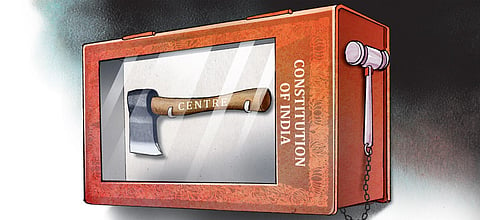

As the nation grapples with its biggest public health crisis, and disparate political parties and groups squabble over arrangements to fight the pandemic, one must thank the country’s Constitution makers for giving us a basic law that enables us to have one central command in times of national emergencies.
Apart from specific emergency provisions, the makers have provided for a fairly large concurrent list in the Constitution’s seventh schedule that gives the Centre greater maneuverability in times of crisis.
The Disaster Management Act (DMA), which is being fully deployed to impose lockdowns and regulate the conduct of citizens to contain the spread of the coronavirus, is a case in point. This Act, passed by Parliament in 2005, has enabled the Centre to lay down rules and ensure strict compliance across the country. Its significance can be gauged from the fact that at last count, there were over 40 political parties governing the 28 states and a couple of union territories that have Assemblies. One wonders what could have happened if this law had not been enacted.
When the country’s Constitution was drafted, the Constituent Assembly witnessed an intense debate on the kind of federal structure that India should have. Dr B R Ambedkar, Chairman of the Drafting Committee, explained to the House that the Indian brand of federalism was distinct from that of the US or Australia and although it was federal, it had strong unitary features to cope with emergencies. In his concluding remarks on the Constitution on 25 November 1949, he addressed the complaint that there was too much centralisation and the states had been reduced to municipalities. Describing this as an exaggeration, he explained that the basic principle of federalism was the demarcation of the legislative and executive authority of the Centre and states in the Constitution itself. Therefore, he said, “The charge that centralisation is defeating federalism must fail”.
As regards the second charge that the Centre had been given the power to override the states, Ambedkar admitted that this was true, but clarified that the overriding powers do not form the normal features of the Constitution. They are to be deployed only in certain exigencies. “Their use and operations are expressly confined to emergencies only.”
He obviously had in mind not only the articles in the Constitution regarding proclamation of an emergency but also the powers vested in the Centre in the Union List and Concurrent List. For example, Item 23 under the Concurrent List gives the Centre the power to make law with respect to “prevention of the extension from one state to another of infectious and contagious diseases or pests affecting men, animals and plants”.
The DMA Act defines disaster as “a catastrophe, mishap, calamity or grave occurrence...” and several of its provisions empower the Centre to take charge when disaster strikes, issue directions and ensure compliance. The series of orders issued by the Union home secretary regarding the lockdown flow from these provisions.
Some of these orders also expressly put the onus on the district administrations in the country and make it clear that the district magistrates and the superintendents of police “will be personally liable for implementation of these directions and lockdown measures issued under the above mentioned orders”.
This is to ensure that the orders are not flouted because generally the district magistrates and superintendents of police are drawn from the central services and they are well acquainted with the consequences of non-compliance in these matters. Apart from the provisions in the Concurrent List and the DMA, the Epidemic Diseases Act, 1897 also arms the Centre with powers to handle epidemics.
In addition, the Constitution vests residuary power in the Centre. That is why noted constitutional experts like K C Wheare say that India is “a unitary state with subsidiary federal features rather than a federal state with subsidiary unitary features”. Ivor Jennings feels that India is a federation “with a strong centralising tendency”.
Why did our Constitution makers vest the residuary powers in the Centre? Dr Ambedkar held the view that the residual loyalty of the citizen in an emergency must be to the Centre and not to the constituent states. For, it is only the Centre that can work for a common end and for the general interests of the country as a whole.
He also explained the role and responsibility of the states when some contingencies arise. “No more than this—that in an emergency, they (the states) should take into consideration alongside their own local interests, the opinions and interests of the nation as a whole.”
When Dr Ambedkar and his colleagues drafted the Constitution, India was virtually a one-party nation with the Congress in complete command both at the federal level and in the provinces. They may not have anticipated over 40 political parties in diverse, at times bizarre combinations, ruling the states, as is the case now. But given the country’s social, economic and cultural diversity, they did anticipate the mushrooming of different ideologies and political parties. We owe it to their foresight for creating the constitutional mechanism to cope with national emergencies like this pandemic.
While one must work in a spirit of cooperative federalism, those who govern the states must respect the wisdom of the nation’s founding fathers. While some peripheral disagreements between the Centre and the states are natural, a calamity of this magnitude calls for national unity and unequivocal commitment to the constitutional mandate.
A Surya Prakash
Vice-Chairman, Executive Council,Nehru Memorial Museum & Library
(suryamedia@gmail.com)